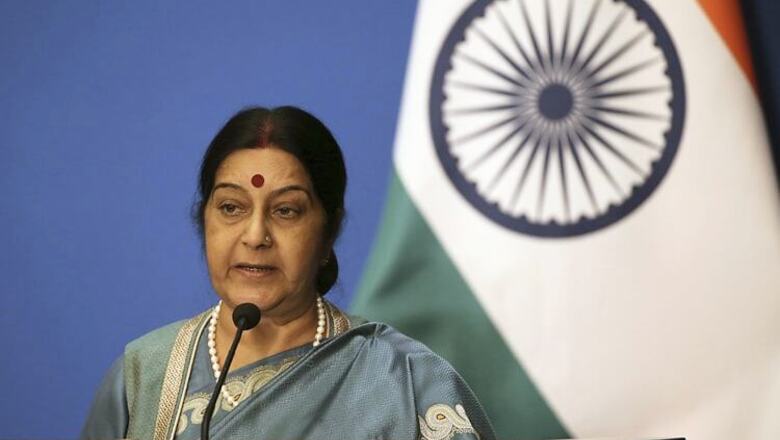
views
Bangkok: India and Thailand on Monday signed a number of important agreements, including the double taxation avoidance treaty, and exchanged instruments of ratification on the extradition treaty inked in 2013, which provides for the legal framework for seeking extradition of fugitive offenders.
The tax treaty provides for the framework to avoid double taxation and prevention of fiscal evasion with respect to taxes so as to promote bilateral economic cooperation.
On the last day of her three-day visit, External Affairs Minister Sushma Swaraj co-chaired the 7th meeting of the India-Thailand Joint Commission for Bilateral Cooperation.
The extradition treaty signed between the two countries in 2013 provides for the legal framework for seeking extradition of fugitive offenders, including those involved in terrorism, transnational crimes, economic offences etc.
The treaty provides for the extradition of any person, who is wanted for trial or for the imposition or enforcement of any sentence by one contracting state and is found in the territory of the other Contracting state.
The exchange of instruments will help both the countries in expediting extradition of fugitives. This treaty will further strengthen the relationship between the security agencies of the two countries, officials said.
The two sides also signed a Memorandum of Understanding (MoU) on the Establishment of Nalanda University. By signing this agreement, Thailand joins other East Asian Summit countries in the establishment of Nalanda University in Bihar.
The agreements were signed by Swaraj and Thai Deputy Prime Minister and Foreign Minister General Tanasak Patimapragorn.
Another significant development during Swaraj's two-day visit is the signing of an MoU on the establishment of an Ayurveda Chair in one of the Thai Universities.
The MoU is between the Ministry of Ayush and Rangsit University of Thailand under which the Central Council for Research in Ayurvedic Sciences will set up a Chair at the Thai University to undertake academic and research activities in Ayurveda.
This particular MoU was signed by Ambassador of India to Thailand Harsh Vardhan Shringla and the President of Rangsit University Arthit Quarairat.
"Laying a sound foundation for future ties. India & Thailand sign a number of important agreements," MEA spokesperson Vikas Swaroop tweeted.
In his other tweets, he said, "The exchange of Instruments of Ratification of Extradition Treaty strengthens framework of our legal cooperation.
"Signing of revised Double Taxation Avoidance Agreement strengthens framework of our economic cooperation."
Swaraj began the day with a call on General Prem Tinsulanonda, President of Privy Council. Co-chairing the 7th Joint Commission meeting, she emphasised trade and investment, connectivity, security cooperation, defence, science and technology and people to people contact as key drivers.
"Our Act East policy perfectly compliments Thailand's Look West policy," she said at the meeting.
She had earlier described Thailand as an important pillar of India's policy and a valued partner, saying the relationship between the two countries has expanded to virtually all areas of bilateral cooperation in recent years.
"Our bilateral relations with Thailand are based on deep-rooted cultural, religious and neighbourly association between the people of our two nations. Our common heritage of Buddhism and the philosophy of compassion, tolerance, non-violence and peace have laid strong foundations for this relationship," she said on Sunday.




















Comments
0 comment